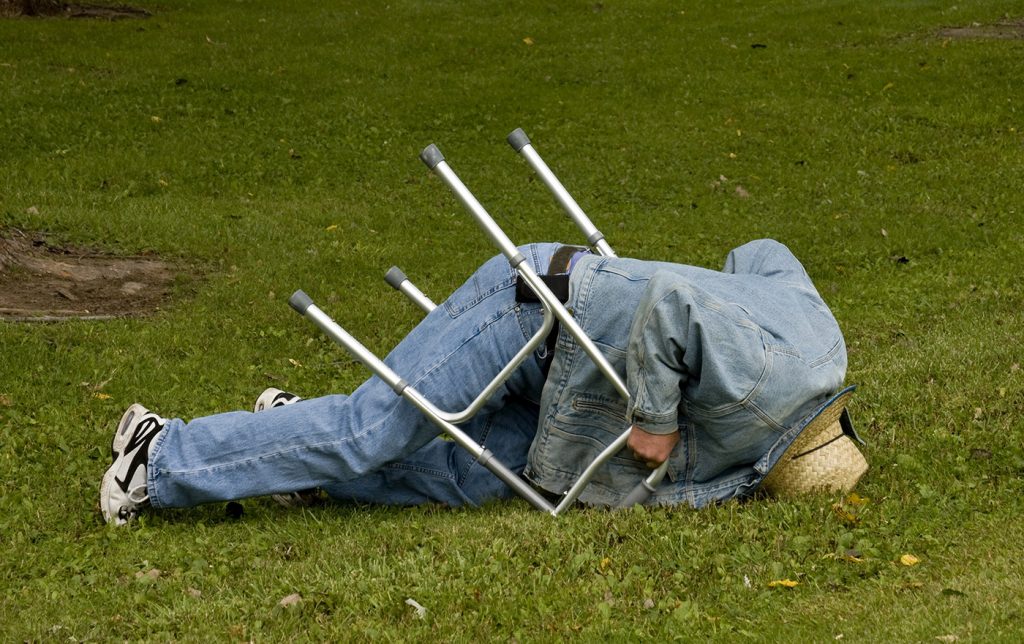
It may come as no surprise that older people tend to fall more often than their younger counterparts. Many of us have known elder family members who have fallen. And even if we haven’t, it’s a part of the cultural mythos surrounding old age. It is true that elderly folks fall with relative frequency. Every year nearly 2.8 million aging Americans end up in the emergency room due to a fall, costing the US healthcare system nearly $31 billion annually, according to the CDC. What’s more, falls are the number one cause for traumatic brain injuries in older people, accounting for 79 percent of all TBI-related doctor visits and deaths for people over the age of 65.
Even though it’s true that older people have a greater chance of falling, it should be stressed that there are a fair number of misconceptions that circulate around this type of event. It’s telling, for instance, that, though a quarter of all older Americans fall every year, only half tell their physician. Thus, it’s very important to clear away some of the myths, so that you or your loved one can feel empowered to handle a fall with clarity and certitude.
Falls Are a Certainty
To begin with, it’s common to assume that falls are inevitable as you get older. This is most definitely not true. There are a number of things you can do to prevent falls from occurring. By regularly going to the doctor, getting your eyes and hearing examined, reviewing your medications, exercising, fall-proofing your home and talking to friends and family for support, you can successfully avoid falling unnecessarily. It’s good to stay positive and proactive, rather than wait for the “inevitable.”
Exercise Is Futile
You may also assume that there’s nothing you can do to reverse muscle loss. This is simply false. You can always start a regular exercise routine to help rebuild muscle. By building more muscle you can effectively reduce your likelihood of falling. It’s probably a good idea to focus on leg strength, as this can be particularly beneficial when it comes to fall prevention. To that end, the CDC recommends Tai Chi, which can help with leg strength and balance.
There’s Only One Cause
Another common misconception is that falls only occur due to diminished muscularity. Actually, there are a number of potential causes. Many falls happen because of drug-induced dizziness, poor eye-sight, external factors in the home or other issues having little or nothing to do with muscular deterioration. That’s why it’s a good idea to be candid with your doctor about falling prevention. They can help point you in the right direction, while highlighting some of the possible causes of falling.
There’s No Method for Fall Prevention
Many people think there’s no particular method for fall prevention – that it’s all a crap shoot. As a matter of fact, there are plans and approaches available to you if you wish to pursue them. The National Council on Aging has a whole page devoted to a number of programs specifically designed to prevent elderly falls. For example, “A Matter of Balance” is an eight-week program that focuses specifically on the fear of falling. This is important, as the fear of falling can lead older people to stay in one place and avoid movement altogether. This might seem like a sure-fire solution, but stasis can lead to further muscle deterioration, which can increase a person’s chances of falling.
It’s Better Not to Tell Anyone
Finally, you may think that keeping your fall to yourself is the best course of action. Perhaps you don’t want to impose on other people’s time, perhaps you’re scared, or perhaps you don’t want to go through the trouble. Though these are understandable reasons, it’s always a good idea to let someone know about a fall. Falls can lead to all sorts of injuries – most notably, TBIs and hip fractures – so failing to let someone know can lead to further complications. It’s best to avoid these complications by getting the help you need.
In the end, it’s always a good idea to be honest and forthright about any concerns you may have. By openly addressing problems with your doctor and loved ones, you can avoid unnecessary injuries down the road.
Related article: AccidentAttorneys.org/nursing-homes-fall-injuries















